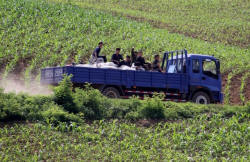North Korean fuel prices drop, suggesting U.N. sanctions
being undermined
 Send a link to a friend
Send a link to a friend
 [July 24, 2018]
By Hyonhee Shin [July 24, 2018]
By Hyonhee Shin
SEOUL (Reuters) - Gasoline prices in North
Korea have nearly halved since late March, market data analyzed by
Reuters shows, adding weight to suspicions that fuel is finding its way
into the isolated economy from China and elsewhere despite U.N.
sanctions.
The U.N. Security Council passed a resolution in December to ban nearly
90 percent of refined petroleum exports to North Korea over its nuclear
and missile programs.
But as North Korean leader Kim Jong Un has moved to improve relations
with the United States, China and South Korea, concerns have grown that
the policy of "maximum pressure" through sanctions and isolation, is
losing steam.
Gasoline was sold by private dealers in the capital Pyongyang at about
$1.24 per kg as of Tuesday, down 33 percent from $1.86 per kg on June 5
and 44 percent from this year's peak of $2.22 per kg on March 27,
according to Reuters analysis of data compiled by the Daily NK website.
Diesel prices are at $0.85 per kg, down about 17 percent from March.

The website is run by North Korean defectors who collect prices via
phone calls with traders in the North.
"My assessment is that there was a greater inflow (of fuel supplies)
from abroad, especially China since Kim's trips there," said Kang Mi-jin,
who works at Daily NK and speaks regularly to sources inside North
Korea.
Kim first visited China to meet President Xi Jinping in March, and they
held two more summits, in May and June.
Last week, U.S. Secretary of State Mike Pompeo accused North Korea of
"illegally smuggling petroleum products into the country at a level that
far exceeds quotas" established by the United Nations.
"Illegal ship-to-ship transfers are the most prominent means by which
this is happening. Every UN member state must step up enforcement," he
wrote on Twitter, without naming any country.
SANCTIONS
North Korea gets most of its fuel from China, its biggest trading
partner, and some from Russia. Washington and Seoul officials have said
the North imports some 4.5 million barrels of refined petroleum products
and two million barrels of crude oil each year.
Last year's U.N. resolution capped refined imports at 500,000 barrels a
year.
Chinese Foreign Ministry spokesman Geng Shuang told reporters on Tuesday
China has consistently and strictly abided by U.N. Security Council
resolutions on North Korea.
China had only exported 7,432 tonnes of refined oil products to North
Korea in the first six months of this year, out of a total of 60,000
tonnes a year stipulated by the U.N. sanctions.
[to top of second column] |

North Koreans take a truck through a path amongst the fields, along
the Yalu River, in Sakchu county, North Phyongan Province, North
Korea, June 20, 2015. REUTERS/Jacky Chen/File Photo

China had reported its exports to the Security Council's sanctions committee in
a timely manner, Geng added.
"The relevant situation is totally open and transparent," he said, without
elaborating.
Overall, China's trade with North Korea in the first half of this year tumbled
56 percent on the back of the tightening sanctions, customs data showed on
Monday.
NO MAJOR SUFFERING
North Korean rice prices have also been stable since a spike last September,
when the U.N. Security Council imposed new sanctions. Rice has hovered around
$0.62 per kg throughout this year.
Stable fuel and rice prices suggest no immediate signs of major suffering in
North Korea despite South Korea's recent estimates the impoverished state's
economy contracted at its sharpest rate in two decades last year.
South Korea's central bank said North Korea's gross domestic product shrank 3.5
percent last year, marking the biggest decline since 1997, citing international
sanctions and drought.
While other defectors reported some suffering in remote rural regions, Kang said
fuel demand has been steady in North Korea, and overall living conditions have
improved in line with a booming unofficial market economy.
The unofficial markets, known as jangmadang, have grown to account for about 60
percent of the economy, according to the Institute for Korean Integration of
Society.
"I've seen signs the economy was slowly improving over the past five years, and
in last year things are still developing but perhaps not as fast as before," a
Western consultant who makes regular trips to North Korea told Reuters.
Kim, who vowed not to let the people "tighten their belt again" in his
first-ever public speech in 2012, announced in April a shift in focus from
nuclear programs to the economy. Analysts say that will be difficult while
sanctions remain in place.

"I don't think there is an outcry in the markets now, but there could be one
toward the end of this year," said Kim Byeong-yeon, a North Korea economy
specialist at the Seoul National University.
(Reporting by Hyonhee Shin. Additional reporting by Josh Smith and Cynthia Kim
in SEOUL and Ben Blanchard in BEIJING. Editing by Lincoln Feast.)
[© 2018 Thomson Reuters. All rights
reserved.] Copyright 2018 Reuters. All rights reserved. This material may not be published,
broadcast, rewritten or redistributed.
Thompson Reuters is solely responsible for this content. |